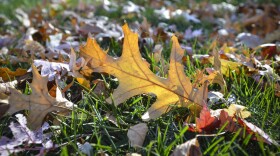-
Tumbleweeds have taken over the High Plains. The plant thrives so well in the western part of Kansas that sometimes they can shut down entire neighborhoods or highways. Plus: An inconspicuous insect is changing what survival looks like as climate change remains a threat.
-
A team of researchers studied the effects of heat on the survival and reproduction of Missouri treehoppers. "This is more of a story of resilience," says a St. Louis University biology professor.
-
Missouri and federal officials are gearing up to stop the advance of a parasitic fly that is less than 70 miles from the United States border with Mexico.
-
Scientists say leaving autumn leaves on the ground can add important nutrients to the soil and create needed habitat for insects.
-
The brown tarantula is about the size of an apple or orange. University of Missouri-St. Louis scientist Becky Hansis-O’Neill and her team of students have been using an app to track their locations, tag and measure them, and learn how to protect their populations.
-
Missouri is one of eight states in the country where a human has been diagnosed with Chagas disease, a parasitic infection spread by bugs. Scientists are now calling on health authorities to declare the disease endemic in the United States.
-
Talks of overhauling the U.S. Postal Service have picked up since President Donald Trump began his second term. With service cutbacks already underway and privatization on the table, rural residents are bracing for more disruptions. Plus: There are more than 40 species of fireflies in Missouri, but for the past few years, people have been concerned about the populations diminishing.
-
There are more than 40 species of fireflies in Missouri, but their populations have been diminishing over the last few years. That's why Missourians have been pleasantly surprised to see so many this summer.
-
A new invasive tick species was recently found in St. Louis County, with more sightings expected this spring and summer.
-
Apple NewsA University of Missouri professor spent years listening to insects — hear how his work is influencing other researchers. Plus, a 117-year-old African American church in Parkville is getting much-needed restoration work thanks to the National Heritage fund.
-
Thousands of insect species use vibrations to communicate. Now, in part because of the foundational research of a Midwestern biology professor, more researchers are exploring insect vibrational communication to ward against pests and understand climate change.
-
American burying beetles bring dead animals underground, turn them into preserved meatballs and feed them to their babies. The St. Louis Zoo is working to save the threatened beetle.
Play Live Radio
Next Up:
0:00
0:00
Available On Air Stations










